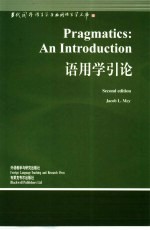图书介绍
语用学引论 英文版2025|PDF|Epub|mobi|kindle电子书版本百度云盘下载

- (丹)Jacob L.Mey著;徐盛桓导读 著
- 出版社: 北京:外语教学与研究出版社
- ISBN:7560023797
- 出版时间:2001
- 标注页数:401页
- 文件大小:18MB
- 文件页数:440页
- 主题词:
PDF下载
下载说明
语用学引论 英文版PDF格式电子书版下载
下载的文件为RAR压缩包。需要使用解压软件进行解压得到PDF格式图书。建议使用BT下载工具Free Download Manager进行下载,简称FDM(免费,没有广告,支持多平台)。本站资源全部打包为BT种子。所以需要使用专业的BT下载软件进行下载。如BitComet qBittorrent uTorrent等BT下载工具。迅雷目前由于本站不是热门资源。不推荐使用!后期资源热门了。安装了迅雷也可以迅雷进行下载!
(文件页数 要大于 标注页数,上中下等多册电子书除外)
注意:本站所有压缩包均有解压码: 点击下载压缩包解压工具
图书目录
PART I:Basic Notions1
1 Defining Pragmatics3
1.1 Preliminaries3
1.1.1 A look at history3
1.1.2 The importance of being a user4
1.2 Pragmatics:Definition and Delimitation6
1.2.1 A definition6
1.2.2 Component,perspective of function?8
1.2.2.1 Component vs.perspective8
1.2.2.2 Function10
1.3.1 Theory and practice11
1.3 What Use is Pragmatics?11
1.3.2 Uses and aims12
1.3.2.1 Why do we need pragmatics?12
Preface by Halliday12
王宗炎序13
1.3.2.2 The aims of pragmatics14
Preface by Chomsky16
2.1 The Pragmatic Waste-basket19
2 Some Issues in Pragmatics19
2.2 Linguists Without Borders21
沈家煊序23
2.3Philosophers,Ordinary People and Ordinary Language23
2.4 Of Cats and Ducks25
导读26
2.5 Linguistics and Reality:Presupposition27
2.6 A World of Users29
Preface36
PART II:Micropragmatics37
3.1 Context39
3.1.1 The dynamic context39
3 Context,Implicature and Reference39
3.1.2 Context and convention42
3.2 Implicature45
3.2.1 What is an implicature?45
3.2.2 Implications and implicatures45
3.2.3 Conversational implicature46
3.2.4 Conventional implicature49
3.3 Reference and Anaphora52
3.3.1 On referring52
3.3.2 Reference,indexicals and deictics53
3.3.3 From deixis to anaphora56
4.1 Principles and Rules67
4 Pragmatic Principles67
4.2.1 The Communicative Principle68
4.2 Some Principles Discussed68
4.2.2 The Cooperative principle71
4.2.2.1 Dostoyevski and the rubber ball72
4.2.2.2 Cooperation and ‘face’73
4.2.2.3 Cooperation and ‘flouting’76
4.2.3 Politeness and other virtues79
4.3 Rethinking Grice82
4.3.1 Horn s two principles83
4.3.2 Relevance and‘conspicuity’85
5.1.1 Why speech acts?92
5 Speech Acts92
5.1 History and Introduction92
5.1.2 Language in use93
5.1.3 How speech acts function95
5.2 Promises97
5.2.1 A speech act s physiognomy:promising98
5.2.1.1 Introduction:the problem98
5.2.1.2 Promises:conditions and rules99
5.2.1.3 The pragmatics of rules101
5.3.1 The number of speech acts105
5.3 Speech Act Verbs105
5.3.2 Speech acts,speech act verbs and performativity106
5.3.3 Speech acts without SAVs109
5.4 Indirect Speech Acts111
5.4.1 Recognizing indirect speech acts111
5.4.2 The ten steps of Searle113
5.4.3 The pragmatic view114
5.5 Classifying Speech Acts117
5.5.1 The illocutionary verb fallacy117
5.5.2 Searle s classification of speech acts119
5.5.2.3Commissives120
5.5.2.1 Representatives120
5.5.2.2 Directives120
5.5.2.4 Expressives121
5.5.2.5Declarations122
5.5.3 Austin and Searle124
6 Conversation Analysis134
6.1 Conversation and Context134
6.2 From Speech Acts to Conversation135
6.3 What Happens in Conversation?136
6.3.1.1 The beginnings of CA137
6.3.1 How is conversation organized?137
6.3.1.2 Turns and turn-taking139
6.3.1.3 Previewing TRPs140
6.3.2 How does conversation mean?143
6.3.2.1 Pre-sequences144
6.3.2.2 Insertion sequences,‘smileys’and repairs145
6.3.2.3 Preference149
6.3.3 From form to content153
6.3.3.1 Cohesion and coherence153
6.3.3.2 Adjacency pairs and content157
6.3.3.3 Types and coherence159
6.3.3.4 Conversation and speech acts162
PART III:Macropragmatics171
7 Metapragmatics173
7.1 Object Language and Metalanguage173
7.2 Pragmatics and Metapragmatics175
7.2.1 Three views of metapragmatics176
7.2.2 I Metacheory177
7.2.2.1 Rules178
7.2.2.2 Principles and maxims:the case for economy179
7.2.3.1 General constraints182
7.2.3 II Constraining conditions182
7.2.3.2 Presuppositions184
7.2.3.3 Speech acts and discourse189
7.2.3.4 Worlds and words193
7.2.4 III Indexing196
7.2.4.1 Reflexivity and Simple indexing196
7.2.4.2 Invisible indexing and indexicality198
8 Pragmatic Acts206
8.1 What Are Pragmatic Acts All About?206
8.2 Some Cases208
8.3.1 Co-opting,denying and the CIA210
8.3 Defining a Pragmatic Act210
8.3.2 ‘Setting up’211
8.3.3 Pragmatic acts and speech acts212
8.3.4 Pragmatic acts and action theory214
8.4 Pragmatic Acts in Context217
8.4.1 The common scene217
8.4.2 Situated speech acts219
8.4.3 Pragmatic acts and body moves223
8.4.4 Pragmatic acts as social empowerment227
9 Literary Pragmatics236
9.1 Introduction:Author and Reader236
9.2 Author and Narrator238
9.3 Textual Mechanisms239
9.3.1 Reference240
9.3.2 Tense241
9.3.3 Discourse244
9.4 Voice and ‘Point of View’247
9.5 Reading as a Pragmatic Act252
10 Pragmatics Across Cultures262
10.1 Introduction:What Is the Problem?262
10.2 Pragmatic Presuppositions in Culture264
10.3 Ethnocentricity and its Discontents266
10.4 Cases in Point268
10.4.1 Politeness and conversation268
10.4.2 Cooperation and conversation269
10.4.3 Addressivity271
10.4.3.1 Forms of address272
10.4.3.2 Social deixis273
10.4.4 Speech acts across cultures:the voice of silence275
11 Social Aspects of Pragmatics289
11.1 Linguistics and Society289
11.1.1 Introduction289
11.1.2.1 Who s(not)afraid of the Big Bad Test?291
11.1.2 Language in education291
11.1.2.2 A matter of privilege293
11.1.3 The language of the media297
11.1.4 Medical language299
11.2 Wording the World301
11.2.1 Metaphors and other dangerous objects302
11.2.2 The pragmatics of metaphoring305
11.3 Pragmatics and the Social Struggle308
11.3.1 Language and manipulation308
11.3.2 Emancipatory language310
11.3.3 Language and gender313
11.3.4 Critical pragmatics315
11.3.4.1 What is‘critical’?315
11.3.4.2 ‘Critical pragmatics’:the Lancaster school316
11.3.4.3 Power and naturalization317
11.4 Conclusion320
Epilogue:Of Silence and Comets329
Notes333
References348
Subject Index363
Name Index386
文库索引393
热门推荐
- 1370717.html
- 1993176.html
- 2336848.html
- 2543733.html
- 915685.html
- 1160601.html
- 3210499.html
- 1206076.html
- 2035877.html
- 3376903.html
- http://www.ickdjs.cc/book_554642.html
- http://www.ickdjs.cc/book_154826.html
- http://www.ickdjs.cc/book_1589895.html
- http://www.ickdjs.cc/book_2009333.html
- http://www.ickdjs.cc/book_3146726.html
- http://www.ickdjs.cc/book_3862001.html
- http://www.ickdjs.cc/book_530299.html
- http://www.ickdjs.cc/book_3383662.html
- http://www.ickdjs.cc/book_3613751.html
- http://www.ickdjs.cc/book_2362597.html